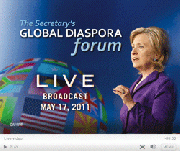WASHINGTON — Secretary of State Hillary Rodham Clinton last
week announced that the State Department was adding a fourth “D” to
its toolbox of Diplomacy, Development and Defense: Diaspora.
Marking an historic shift in the agency’s view of global
migrants, Clinton spoke at the opening of a three-day “Global Diaspora
Forum” that drew over 300 invitees including a star-studded cast of
international development experts, diplomats and representatives of different
diaspora groups.
“You have the potential to be the most powerful
people-to-people asset we can bring to the world’s table,” Clinton told a
standing room only crowd at the State Department’s Loy Henderson Auditorium.
“Because of your familiarity with cultural norms, your own motivations,
your own special skills and leadership, you are, frankly, our Peace Corps, our
USAID, our OPIC, our State Department rolled into one.”
Clinton highlighted the contributions of some 60 million
Americans who last year sent over $48 billion in remittances to countries
around the world. “It dwarfs any foreign aid that our government can
give,” she noted.
Clinton also acknowledged that diaspora groups and
individuals are the first to respond to natural disasters, economic stagnation,
poverty or civil unrest overseas. “When an earthquake happens in Haiti or
civil unrest begins in Tripoli or a multitude of disasters hit Japan, we hear
from Americans who have roots, who have business connections, who want to know
what they can do.”
Clinton was most passionate when it came to the intersection
of diaspora communities and diplomacy. She pointed to the role of Irish
Americans in bringing peace, at long last, to Northern Ireland. She recounted
the first time she and her husband, Bill Clinton, went to Belfast, where the
hotel they stayed in “had been recently bombed and windows were still
boarded up.” Because of the
help of Irish Americans, the next time she went back after the Good Friday
Accords, “there was 98 percent occupancy.” She noted how conflicts
de-escalate when women become engaged and find common ground as wives and
mothers.
The secretary of state also emphasized the leadership of
American diaspora communities in helping home countries in their transition to
democracy.
“Many don’t know the first thing about politics…and
this is where many of you can come in. We need to just get into the basics of
what it means to participate in the hard and sometimes frustrating work of
politics. That’s the way you get to govern in a democracy.”
As the United States grapples with difficult global
challenges — whether natural disaster, war, economic recession, or terrorism —
it would be impossible for it to work alone, she concluded. These challenges
will only be solved by partnership with the private sector, civil society,
public institutions and diaspora communities.
To that end, Clinton announced the launching of the
International Diaspora Engagement Alliance (IDEA). “We spend a lot of time
in the State Department trying to think of how we can put words together so the
first letter spells something,” she joked, but she added that IDEA would
engage “the whole of government.”
She ended with a call to action: “I hope you will look
back on this day and really see that we started something that has just spread
across the world, improving the lives of so many people, giving them the same
chance that all of us have had because of this country that we love and we call
home,” Clinton said.
The conference —
cosponsored by the Migration Policy Institute (MPI) — featured the heads of the
Export-Import Bank, the Inter-American Development Bank, the U.S. Trade and
Development Agency, the Millenium Challenge Corporation and the International
Fund for Global Development, as well as dozens of Non-Governmental Organizations
and grassroots organizations. New America Media ran a special workshop on
diaspora communications which featured a panel of ethnic media leaders and
reporters.






Leave a Reply